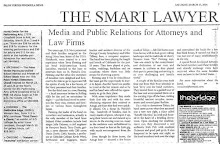Though it is your job to steer an interview toward your talking points, the journalist’s job is to get the information they want.
Usually you can both achieve your goals. Occasionally you come to loggerheads.
At that point you might face some tough questions designed to trip you up and get you off your message and on to the journalist's message. As an attorney you are familiar with trick or hostile questioning. So don't let yourself be caught off guard just because the questions are coming from a journalist rather than opposing counsel. If you know this is possible and have your focus you'll handle this situation just fine.
Again, the best advice might be to put yourself in the same frame of mind you'd have on the record in open court. Prepared. Eyes and ears open. Self-aware and on your toes.
Here are examples of tough questions:
Loaded question: the journalist asks you to choose between A and B, neither of which is your position. Rephrase and stay on your own talking points, not the journalist’s.
Empty chair questions: A journalist might say "person X said Y." Common sense here. State that you didn’t hear that comment, don’t speculate, and move back to your talking points.
Guilt by association: Because you may agree with another party on issue X, doesn’t mean you agree with them on issue Y as well. Don't follow that road and don't criticize. Reassert your own talking points.
Words in your mouth: Reporters will often take what you say and repeat it back-- mangled and inaccurate. Don't allow this. Repeat your own talking points back to them. Stay assertive but calm.
Inconsistency: You may change your view over time and the reporter calls you on it. Stay calm, and explain the reason your position or policy had to change. This is a great opportunity to expand on your talking points.
Cheap shots: A journalist may tease or insult. Don’t let it slide but also remain calm. Put on your "on the record" hat and let the nastiness roll off your back. The journalist won't print or use their nasty comment, but they will use your defensive response. Keep positive, assertive, and on message.
Irrelevant questions: These will try to get you off message and onto a topic you don’t want to discuss. Bridge back to your own message. Be polite but firmly steer back to your talking points.
Misunderstanding: You have tested how your talking points work [haven't you?] and you have confidence in them. However, a reporter may misunderstand —if so, clarify the point while remaining positive.
Personal opinion: whatever you think personally is trumped if you are representing your client, firm, or attorneys in general. Remember who you are speaking for--your firm, your client, your partner, your practice area, attorneys in general.
Don't let the idea of tough questions bother you. This game is taking place on your home court. I have been told by many journalists that they do not like interviewing attorneys because journalists are often intimidated by the perceived interviewing skills of the attorneys. I can tell you from personal experience that attorneys are the most challenging people to interview. So relax. Just keep your wits about you and you will have the upper hand.
Your reputation is your most valuable asset
Subscribe to:
Post Comments (Atom)







No comments:
Post a Comment